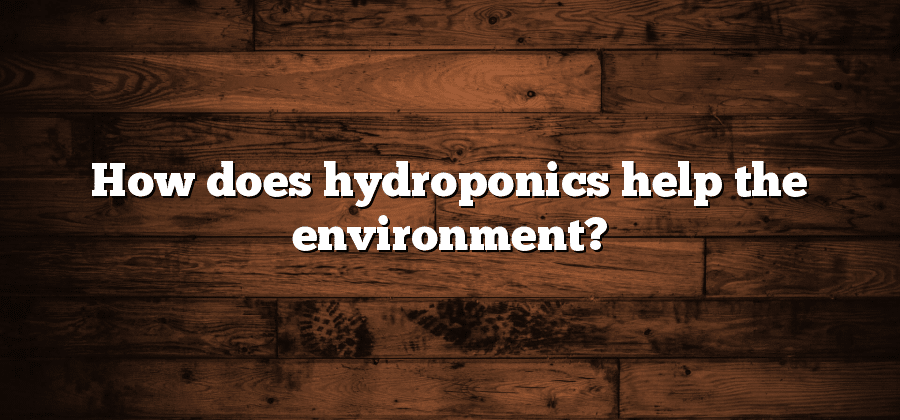Resource Conservation: Hydroponics minimizes water usage compared to traditional farming methods.
Hydroponics, as a method of cultivation, provides a sustainable solution for resource conservation, specifically in terms of water usage. Unlike traditional farming methods that heavily rely on water for irrigation, hydroponics minimizes water consumption significantly. This is achieved through the use of a closed-loop system that recirculates the nutrient-rich water. By constantly recycling and reusing water, hydroponic systems preserve this precious resource, making it an ideal choice for areas with limited water supply or regions prone to droughts. Furthermore, the controlled environment of hydroponics allows for precise monitoring and adjustment of water levels, ensuring optimal hydration for the plants without any unnecessary waste.
Another advantage of hydroponics in terms of resource conservation is its ability to eliminate the need for soil. Traditional farming methods heavily rely on fertile soil, which can be depleted through continuous use and erosion. However, hydroponics eliminates soil as a medium for plant growth, reducing soil erosion and preserving valuable agricultural land. This eliminates the need for extensive land preparation, tilling, and the cultivation of large areas of land, which often leads to deforestation and habitat destruction. Hydroponic systems offer a compact and efficient alternative, allowing for cultivation in areas with limited space or in areas where fertile soil is scarce or contaminated.
Soil Preservation: Hydroponics eliminates the need for soil, reducing soil erosion and preserving valuable agricultural land.
Hydroponics, a soil-less farming technique, revolutionizes the way crops are grown, providing a sustainable solution to soil preservation. By eliminating the need for soil, hydroponics significantly reduces soil erosion and helps preserve valuable agricultural land. This is especially crucial in regions where fertile soil is limited or experiencing rapid degradation.
Traditional farming methods often lead to soil erosion as a result of intensive tilling, water runoff, and exposure to harsh weather conditions. As topsoil is eroded, essential nutrients are lost, compromising the productivity and fertility of the land. However, with hydroponics, plants are grown in nutrient-rich water solutions, eliminating the risk of soil degradation. This innovation not only ensures that valuable agricultural land is preserved but also allows crops to be grown in areas where soil conditions are unsuitable for traditional farming.
Moreover, hydroponics provides an opportunity for urban and indoor farming, where arable land is limited or non-existent. By utilizing vertical or vertical farming systems, hydroponics maximizes the use of limited space, allowing vegetables, herbs, and even fruits to be grown in vertically stacked layers. This not only saves land but also minimizes the need for transportation, reducing greenhouse gas emissions associated with the supply chain.
In conclusion, hydroponics plays a vital role in soil preservation by eliminating the need for soil, reducing soil erosion, and preserving valuable agricultural land. With a growing population and increasing pressure on our natural resources, this innovative farming technique presents a sustainable solution for meeting the world’s food demand while mitigating the negative impacts of traditional agriculture on our environment.
Pest and Disease Control: Hydroponics reduces the reliance on pesticides and herbicides, resulting in a healthier environment.
Hydroponics, as an innovative farming method, offers numerous advantages when it comes to pest and disease control. One key benefit is the reduced reliance on pesticides and herbicides, resulting in a healthier environment. In traditional farming, conventional pesticide use can often lead to chemical residues in food products and pose potential risks to human health. However, with hydroponics, pests and diseases can be managed in a more targeted and sustainable manner.
Hydroponic systems provide a controlled environment that minimizes the chances of pest and disease outbreaks. By eliminating soil in hydroponics, the risk of soil-borne pathogens and pests is significantly reduced. This allows growers to focus on preventive measures and biological pest control methods, such as introducing beneficial insects or using natural predators to target specific pest populations. Consequently, the reduced reliance on chemical pesticides not only keeps the environment healthier but also contributes to the production of safe and high-quality crops.
Efficient Nutrient Utilization: Hydroponic systems optimize nutrient absorption, minimizing the release of excess nutrients into the environment.
Efficient nutrient utilization is one of the key advantages of hydroponic systems. Unlike traditional farming methods, where plants obtain nutrients from the soil, hydroponics allows for precise control over nutrient delivery. Nutrient solutions are carefully formulated to provide plants with the ideal balance of vitamins, minerals, and other essential elements. This optimized nutrient absorption not only promotes healthier plant growth but also minimizes the release of excess nutrients into the environment.
By reducing nutrient waste, hydroponics helps prevent water pollution. In traditional agriculture, excess nutrients can leach into the soil and eventually reach rivers, lakes, and other water bodies, leading to harmful algal blooms and oxygen depletion. However, with hydroponics, the risk of water contamination from agricultural runoff is significantly reduced. The closed-loop system ensures that nutrients are absorbed by plants efficiently, leaving little to no excess to leak into surrounding ecosystems. This not only benefits the environment but also helps in conserving precious water resources.
Reduced Water Pollution: With hydroponics, the risk of water contamination from agricultural runoff is significantly reduced.
Hydroponics offers a sustainable solution to reduce water pollution caused by agricultural runoff. Unlike traditional farming methods that rely on soil, hydroponics eliminates the need for soil altogether. This eliminates the risk of soil erosion and the subsequent contamination of water bodies with sediments and agricultural chemicals.
By growing plants in a controlled environment, hydroponic systems optimize nutrient absorption and minimize excess nutrient release into the environment. This is in stark contrast to conventional farming, where excess nutrients from fertilizers often leach into nearby water sources, leading to water pollution and the proliferation of harmful algal blooms. With hydroponics, the precise management of nutrient solutions ensures that the plants receive only what they need, while minimizing nutrient runoff and its detrimental effects on water quality.






